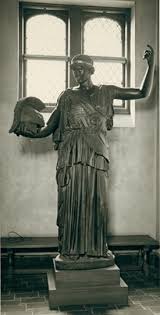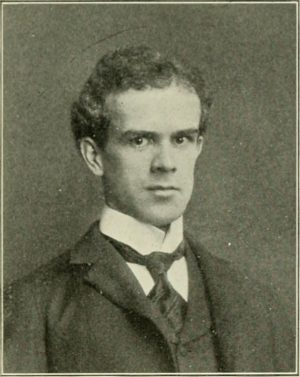What you need to know to be a true Mawrtyr.
By Chloe Vilkin
Bryn Mawr College is known for its major traditions, but the everyday traditions are just as important. Learning the campus lingo can be confusing as a new student. Here is a lexicon of helpful words to know to become a true Mawrtyr.
Bra tree [brah][tree] noun
- a Weeping Hemlock located outside of Rockefeller dorm. This tree is often found with a bra or two strewn about its branches.
The scent of pot can be smelled wafting around the walkway next to this tree most days, as it is visited daily by students who wish to smoke marijuana cigarettes under the privacy of its floor-length tangle of branches. At some point, probably years ago, students maneuvered a wooden bench between the branches of the tree so they could sit comfortably while smoking:
“I heard a few underclassmen outside of the canopy ask each other if they thought it smelled like weed, and I looked over to my friend and whispered, “Don’t they know they are right by Bra tree?”
Bryn Mawr Chop [brin][mahr][chop] noun
- a dramatic haircut often gotten at some point during a student’s time at Bryn Mawr College. The haircut stereotypically involves one “chopping” their hair from a long

A Bryn Mawr student getting her chop
length to a collarbone-or-shorter length. This change often—but definitely not always—coincides with some sort of shift in the student’s gender identity or pronouns. This haircut is not necessarily a one-time-only experience:
“I saw that Meagan had shaved her head before the school year began when I walked in to the first journalism class of the year. The year before she cut her long locks into a short bob, and the year before that she shaved one side of her head. I asked how she would continue her yearly tradition of the Bryn Mawr Chop if she had already shaved her head, but she did not have an answer.”
- see also: post-breakup haircut
Cancel culture [kan-suhl][kuhl-cher] noun
- the general ease with which people are “cancelled” for because of statements or actions made that go against the unspoken norms of the political, social, and philosophical beliefs of the student body and faculty. The cancel culture at Bryn
 Mawr is substantial, despite the fact that the norms shift with time. Students seem always ready and willing to call each other out for doing or saying “problematic” things; the issue with this sort of culture is that students are so ready to “cancel” other people they often do not give them a chance to correct their behavior or change their point of view:
Mawr is substantial, despite the fact that the norms shift with time. Students seem always ready and willing to call each other out for doing or saying “problematic” things; the issue with this sort of culture is that students are so ready to “cancel” other people they often do not give them a chance to correct their behavior or change their point of view:
“I told my friend that I like to watch Jeffree Star’s YouTube videos and she asked me if I did it ironically, because he is cancelled.“
“In my head I thought: “Well, he apologized for using a slur, which was like 10 years ago, and he has changed his behavior since then, and this is why I hate cancel culture because people are not allowed to move on after they make a mistake.”
Out loud I just said, “no.”
Chamber of Secrets [cheym-ber][uhv, ov][see-krits] noun
- a small, unlit room within the depths of Old Library. This room sits at the very end of the odd tunnels in the basement of Old Library, formerly known as Thomas Hall. It is located next to a door that leads from the tunnels to the lobby area of the graduate student lounge.
The Chamber has been blocked off with a chain link door and a padlock since 2015, although this has not stopped students from maintaining the tradition of writing their names in the Chamber. Instead of writing on the walls and across the pipes that run along the low-hanging ceiling inside the Chamber, students scroll their Sharpies along the edges of the door and the eggshell-colored walls:
“It was 2016 and I was a first-year contemplating what incredible thought to write outside the Chamber of Secrets as part of the first night of Hell Week. “Fuck the Patriarchy,” I said out loud as I uncapped my pen.”
Denbigh fire [den-bee][fahyuh r] noun
- a fire that burned down the entirety of Denbigh Hall in 1902. According to legend, the fire began when a gust of wind knocked over a student’s oil lamp. Allegedly everyone survived the fire except one person, a man who was in the basement of the building when the blaze went up:
“I’m not surprised there was a Denbigh fire, it is literally insulated with horsehair and hay.”
Fake Athena [feyk][uh–thee–nuh] noun
- a re-creation of the original marble Athena statue that was stolen and broken in 1996. The original 200-pound statue of the Greek goddess was stolen from the corner of the Great Hall by a group of five Haverford students in the middle of the night. The students shoved Athena into the back of a Ford Escort wagon, breaking off her head and one arm by accident.
Fake Athena now stands where the original statue stood. She is made of plaster gauze, papier mâché, fiberglass resin, foam peanuts, floral wire, electrician’s tape, real cat hair, wood, and string, and was created by classics major Jan Trembley ’75.
Ghosts [gohsts] noun (plural)
- A variety of spirits seen or felt around the halls of some of the older buildings on Bryn Mawr’s campus. Two of the ghosts are well-known characters of the college, and any others are among a random assortment of sightings. Lillian Vickers, class of 1903, is said to haunt the third floor of Merion Hall.

Boo!
Although there are several theories surrounding her death, evidence suggests that her bath robe caught fire while she was wearing it and she later died from complications due to the fire. Some say that she believed she had leprosy and had taken a kerosene bath to try and cure herself and her robe was accidentally lit by either a dropped lantern or a dropped lit match. Lillian can be heard humming in the hallway and will occasionally open the doors to peoples’ rooms.
The story of the Denbigh ghost, a spirit that haunts the second and third floors of Denbigh Hall, is even more mysterious. This is the ghost of the man who died in the Denbigh fire, allegedly a staff member who was having an illicit affair with a student. This unknown man would sneak into the servants’ quarters in the basement of Denbigh Hall at night and knock on the ceiling, or rather floor, of his beloved’s room. He is said to have perished in the fire, but there is no record of anyone dying. Regardless, “Danny Denbigh” can still be found opening and closing doors in Denbigh Hall:
“Did you hear about the Bryn Mawr ghosts? Somebody told me the one in Merion set herself on fire.”
Haffner [hahf-ner] noun
- also known as New Dorm Dining Hall, Haffner or Haff is a colloquial name for one of the campus’ two dining centers. New Dorm Dining Hall and New Dorm the dorm were originally called Haffner Dining Hall and Haffner Hall. When the dorm transitioned from being a language dorm to not being one, the name Haffner was taken off of the buildings. Nobody has given enough money to the college since then to have their name attached to the buildings, so they are officially referred to by the New Dorm nomenclature:
“Hey, we should get dinner tonight! Do you want to eat at Erd or Haff?
Haverbro [hav-er broh] noun
- a stereotypical male Haverford student. You will usually have at least one

Haverbro circa 1900
Haverbro in a class with you per semester.
These bros are often on sports teams, denoted by the presence of a jersey, a hat, or a milk jug full of water. Other ways to spot a Haverbro include, but are not limited to: if a man is eating an untoasted bagel in class; if the phrase “piggybacking off of that” is used; or if a man tries to explain what you just said in class but in a shittier way:
“The Haverbros love to come to Bryn Mawr for the hot chicks and the Haffner pizza.”
Haverwhore [hav-er hohr] noun
- A Bryn Mawr student who takes the majority, if not all, of their classes at Haverford. This student may also major at Haverford, likely because the major she wanted was unavailable—or the department was a hot mess—at Bryn Mawr. The Haverwhore is a sad species, often pitied by her friends for having to regularly eat at the sub par Haverford Dining Center:
“If you look to your right you will see Maya, the local Haverwhore. She is a political science major at Haverford and is taking all four of her classes at Haverford this semester.
Hell Week [hel][week] noun
- the former name for what is currently known as Welcome-The-First-Years Week. Hell Week was the name of the Bryn Mawr tradition where first years and transfer students, labeled “hell babies” or “hellees”—now called “buds”—would put together a fun proposal of some sort to ask upperclassmen to be their “hell parents” or “hellers”, now called “roses”. The heller then creates a completely optional schedule of fun tasks for the hellee to do during Hell Week, which occurs mid-February.
The change in name occurred when the college received a complaint that a student felt uncomfortable with some of the aspects of the tradition. to maintain the spirit of the tradition while ensuring that any ideas of hazing were not associated with it, the college changed the name. Most students still use the beloved original terms:
My hell grandchild just got two hell babies. I am so excited for Hell Week!
Mawrtyr [mahr-ter]
noun
- a current or former student at Bryn Mawr College. Bryn Mawr is a historically women’s college, which means it now accepts students who are non-binary and transgender as well as women:
Oh wow, that person who is not a cisgendered man seems brilliant, bright, and beautiful. They must be a Mawrtyr.
Carey Thomas [em][kar-ee][tom–uh s] noun
- second president of Bryn Mawr College. Thomas is also known as she-who-shall-not-be-named, as her name has been removed from the building it used to be on.

Persona Non Grata
The Great Hall used to be called Thomas Great Hall after the former president, until students in 2017 demanded that the true legacy of Thomas be brought up and her name be taken down. Thomas, while she fought for women’s right to education, only fought for white, Christian women.Thomas used her power as president to block opportunities for black and Jewish women, highlighting her bigotry.
The college officially decided to remove Thomas’ name from all references to the campus after a year of students demanding the acknowledgement of such a racist and anti-Semitic history:
“I am glad that the Great Hall got to keep its initial (TGH), even though M. Carey Thomas is cancelled.”
Rhoads beach [rohds][beech] noun
- a vast grassy hill with a gentle slope located behind Rhoads Hall — essentially a large backyard.
Students can be seen sunbathing in spring and summer near the duck pond at the bottom of the hill. In the winter, makeshift sleds are used to glide down fresh snow.
Across the way lies the president’s house, which is empty most of the time seeing as the current president does not actually live there. This is good news for the stoners that like to stare out at the pond as they spark up, a sight you can find on practically any warm, sunny day:
“I asked her if she wanted to meet at the bra tree and she said we should meet at Rhoads beach instead.”
Valley of Death [th uh][val-ee][uhv, ov][deth] noun
- the place students must walk through to get from the top of “the Valley” to Brecon Hall, the second-farthest dorm from Bryn Mawr’s main campus.
The walk requires you to descend a long set of stairs down to the athletic fields, cross the side of the fields, and then climb a longer flight of steps and cross the street.
The top of this area is also known as just “the Valley”, specifically a spot atop the hill that overlooks the fields. This spot is surrounded by tall trees and has several benches attached to the hillside with cement blocks, making it another favorite spot for smokers on campus:
“When I filled out my housing application form, I just left Brecon off the list entirely. There is no way I am walking through the Valley of Death every day.”
Chloe Vilkin writes about Bryn Mawr traditions, sometimes tongue in cheek.
